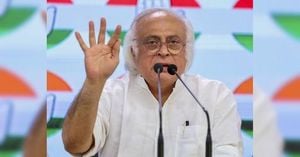Brazil is set to shake things up in the satellite internet space as it eyes alternatives to Elon Musk's Starlink service. Recently, Brazil's state telecommunications firm, Telebras, forged a partnership with China's SpaceSail to expand internet access, especially for remote areas where conventional fiber optics aren't feasible. This collaboration, outlined through a memorandum of understand, is expected to roll out by 2026, with SpaceSail aiming to establish its local subsidiary by the end of this year.
SpaceSail’s CEO, Jason Jie Zheng, expressed excitement about the new endeavor, declaring, "Our memorandum is not just a partnership but a shared commitment to empowering underserved regions." This could be significant for Brazil, where Starlink currently holds around 46% of the satellite internet market. The country has been working to reduce its reliance on Musk’s business.
This tumultuous relationship with Musk isn't new. Just this past August, tensions flared when the Brazilian Supreme Court justice suspended X, formerly known as Twitter, throughout the country, coupled with freezing Starlink's accounts. This move came after Musk failed to appoint a legal representative within Brazil. Fortunately for Musk, the ban was lifted in October, but it highlighted the growing rift between Brazil and one of its most prominent digital service providers.
The Brazilian Communications Minister, Juscelino Filho, responding to concerns about favoring SpaceSail over Starlink, clarified, "Nothing in any industry is good when you only have one provider." This statement underlines the significance of fostering competition to improve services for consumers.
The tension between Musk and Brazilian officials recently translated to public events. During a social function before the G20 summit, Brazil’s first lady, Janja Lula da Silva, paused mid-speech when she heard a noise outside, jokingly connecting it to Musk and expressing, "I think it's Elon Musk. I'm not afraid of you, by the way." Her comments to Musk included less-than-flattering language, drawing attention on social media, where Musk took it lightly, responding with laughing emojis and quipping about Brazil’s upcoming elections.
This recent shift toward SpaceSail took center stage during the G20 summit held in Rio de Janeiro. There, Chinese President Xi Jinping announced China’s commitment to deepening ties with Brazil, asserting, "China-Brazil relations are now at their best moment ever." The signing of the agreement with SpaceSail, which launched its satellites earlier this year, is emblematic of this strengthening bilateral relationship.
SpaceSail has launched eight satellites so far, increasing its operational constellation to thirty-six, with plans for over six hundred by the end of 2025. Meanwhile, Starlink had already launched more than five thousand satellites since its inception, with aspirations of eventually reaching around forty-two thousand satellites, focusing on global internet accessibility.
This moment marks Brazil's strategic pivot away from solely relying on Starlink for its internet services, allowing for new entrants like SpaceSail to compete and innovate within this growing market. Given the untapped potential of various areas within Brazil, this partnership could provide much-needed alternatives to the rural communities eagerly awaiting enhanced internet connectivity.



